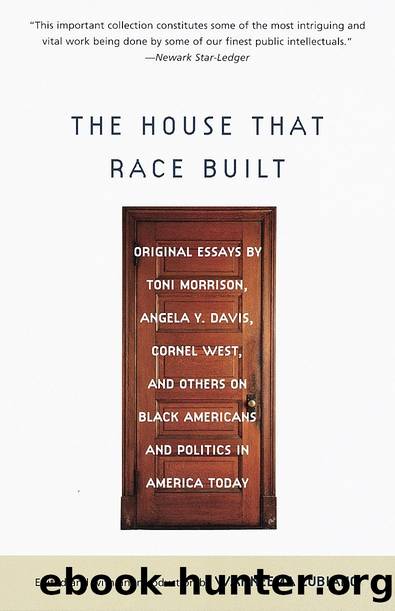The House That Race Built by Wahneema Lubiano & Toni Morrison

Author:Wahneema Lubiano & Toni Morrison [Lubiano, Wahneema & Morrison, Toni]
Language: eng
Format: epub
Tags: Social Science, Ethnic Studies, African American Studies, Essays, Biography, Autobiography, Cultural; Ethnic & Regional, Non-Fiction
ISBN: 9780307556790
Google: tiFVHZy0vUsC
Amazon: 0679760687
Publisher: Knopf Doubleday Publishing Group
Published: 2010-06-08T23:00:00+00:00
RETHINKING VERNACULAR
CULTURE
Black Religion and Race Records in the 1920s and 1930s
Evelyn Brooks Higginbotham
IF BLACK RELIGIOUS CULTURE in its varied beliefs and practices has fostered bright and shining stars such as Martin Luther King, Jr., Malcolm X, Marian Anderson, Aretha Franklin, Jesse Jackson, and Cornel West, then as this list of names suggests, black religious culture has played a significant role in the contestation of ideologies in African-American communities. This contestation occurs between the middle class and working class, and it also occurs within the working class itself. Unfortunately, the trend in recent scholarship has not given the religious culture of the working class the attention it deserves. Some of the most imaginative and analytically sophisticated studies tend to privilege the secular life of black working-class communities. Such studies often draw upon the ârace recordsâ of the 1920s and 1930s, linking blues records with socioeconomic processes of migration and urbanization. They focus on the lyrics of the blues and the lives of blues singers as emblematic of sexual freedom, iconoclastic values, and an overall culture of resistance to the hegemony of middle-class ideology.1 Implicitly, if not explicitly, the blues is deemed the âauthenticâ signifier of African-American culture.2 Blues culture, working-class culture, and âblacknessâ become virtually synonymous. The religious culture of the working poor, when visible at all, appears as an anomaly or false consciousness. The blues and church are thus counter-posed as cultural icons of class division. Perhaps this representation of working-class religion stems from the belief that African-American Christianity is white-derived, middle-class in orientation, and thus less authentically black. Or conversely, perhaps religion among the poor is not taken seriously because it is perceived as otherworldly, lower-class escapism, having no ideological implications and playing no strategic role in struggles over moral and cultural authority.
The race records of the 1920s and 1930s are useful for analysis, since they included not only the blues but also the explicitly religious articulations of the black working class.3 Companies such as Okeh, Victor, Vo-calion, and Paramount recorded vernacular discourses of religion in the form of sermons and gospel music, called gospel blues, as eagerly as they recorded the raunchiest blues lyrics.4 The religious records tapped into the cultural repertoire of storefront Baptist churches and the rising numbers of Holiness and Pentecostal churches in urban ghettos. Langston Hughes recalled his impressions of the Holiness churches in Chicago around the time of World War I: âI was entranced by their stepped-up rhythms, tambourines, hand clapping, and uninhibited dynamics, rivaled only by Ma Rainey singing the blues at the old Monogram Theater.â5 Just as Hughes had juxtaposed the songs of the church with the blues, this odd coupling of the sacred and profane appeared regularly in newspaper advertisements for race records. Paramount Records informed the readers of the Chicago Defender that they could âget these Red-Hot Blues and Inspiring Spiritualsâ through mail order. Okeh included in a single advertisement blues singer Lonnie Johnson and gospel singer Jessie May Hill. Featuring Johnsonâs âMean Old Bed Bug Blues,â the advertisement read: âBedbugs big as a jackass bite you and stand and grin.
Download
This site does not store any files on its server. We only index and link to content provided by other sites. Please contact the content providers to delete copyright contents if any and email us, we'll remove relevant links or contents immediately.
Down the Drain by Julia Fox(463)
Love, Pamela by Pamela Anderson(307)
Minnie by Marianne van Velzen(298)
The Foxfire Book of Appalachian Women by Kami Ahrens(283)
You're That Bitch by Bretman Rock(282)
Simple Passion by Annie Ernaux(264)
Drinking Games by Sarah Levy(196)
Limitless by Mallory Weggemann(180)
Novelist as a Vocation by Haruki Murakami(172)
Memoirs of an Indian Woman by Shudha Mazumdar Geraldine Hancock Forbes(170)
Oh My Mother! by Connie Wang(148)
A Renaissance of Our Own by Rachel E. Cargle(146)
Brazen by Julia Haart(140)
Thinning Blood by Leah Myers(137)
My What If Year: A Memoir by Alisha Fernandez Miranda(134)
Jan Wong's China by Jan Wong(131)
Master Your Mind by John Willson(130)
The House That Race Built by Wahneema Lubiano & Toni Morrison(124)
I Give because I'm Blessed--I'm Blessed because I| Give by Moji Taiwo(124)
